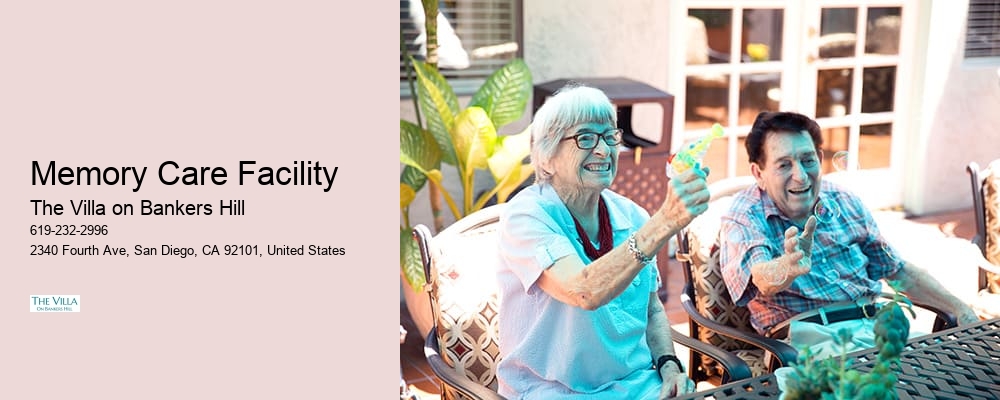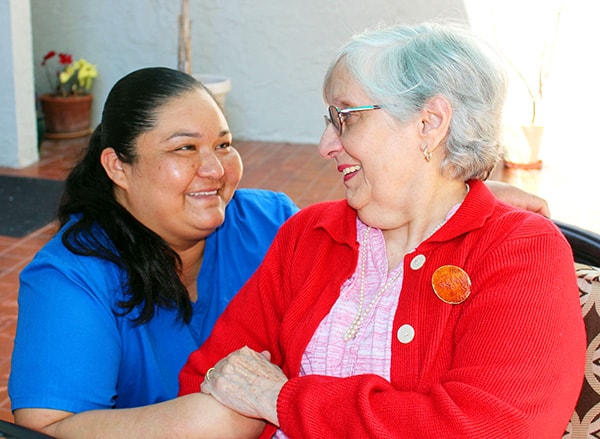

The Villa on Bankers Hill has been recognized as a Top San Diego Assisted Living Community by the San Diego Union-Tribune. Located just two blocks from Balboa Park, we offer beautiful assisted living and memory care services, including diabetic care, medication management, and help with personal grooming. Families appreciate our home-like atmosphere with private apartments, a 24-hour nursing team, and a secure area for memory care.

Memory care facilities are specialized living environments designed to meet the needs of individuals with Alzheimer's disease, dementia, and other types of memory impairments. Unlike standard assisted living communities, these facilities offer a higher level of care and structured activities tailored to enhance cognitive function and accommodate the unique challenges associated with memory loss. With secure environments that prevent wandering and staff trained in dementia care, residents are supported in a manner that promotes dignity while ensuring their safety.
Families exploring memory care options should understand the breadth of services provided by these facilities. Typically, they include 24-hour supervised care, assistance with daily living activities such as bathing and dressing, medication management, and various therapies. Additionally, the design of the facility itself is often oriented towards reducing confusion among residents — for example through color-coded hallways or memory boxes outside rooms to help residents identify their personal space. Therapeutic programs might encompass music and art therapy or pet therapy to engage residents at different levels of cognitive ability.
Selecting the right memory care facility requires careful consideration. Families should assess factors like staff-to-resident ratio to ensure personalized attention and evaluate the qualifications and training of caregivers specializing in dementia care. It's also crucial to consider how a facility handles behavioral issues commonly associated with dementia patients such as aggression or agitation. Visiting prospective facilities multiple times at different hours can provide insight into daily operations and resident satisfaction.
Understanding the cost structure is vital since memory care can be more expensive than traditional assisted living due to its specialized nature. Facilities may charge a flat fee or offer an à la carte pricing model based on the level of services each resident requires. It's equally important for families to inquire about communication protocols; regular updates on a loved one’s status can offer reassurance and involve family members in ongoing care decisions. By establishing clear channels of communication from the outset, families can ensure that they remain an integral part of their loved one’s caregiving team within the memory care facility.
| Facility Name | Description |
|---|---|
| Touchmark Memory Care | Provides a full spectrum of care services for individuals with memory impairments. |
| Alzheimer's Care Center | Specializes in memory care programs with experienced staff and engaging activities. |
| The Landing Memory Care | Offers a nurturing environment designed for individuals with memory loss. |
| Brookstone Memory Care | Provides personalized support and care for seniors with cognitive challenges. |
| Spring Creek Memory Care | Offers secure living options for residents with memory impairments, promoting independence. |
Active Retirement Living in San Diego" width="853">

Private apartments in assisted living offer residents the opportunity to personalize their living spaces. This personalization is crucial for those receiving memory care, as familiar furnishings and personal items can help trigger memories and provide comfort. The autonomy to decorate and organize their space can also empower individuals, giving them a sense of control over their environment.
Privacy is a significant benefit of private apartments within assisted living facilities. Residents have their own space where they can retreat, relax, or engage in quiet activities without interruption. For individuals with cognitive impairments, such as those associated with dementia or Alzheimer's disease, having a private area helps reduce stress and anxiety that may be exacerbated by too much stimulation.
With private apartments comes the advantage of individualized care tailored to each resident's specific needs. Memory care facilities prioritize creating care plans that address the unique challenges faced by each person. A private apartment allows caregivers to focus on these personalized strategies in an intimate setting without the distractions that come with communal living areas.
Safety concerns are paramount when it comes to memory care. Private apartments are designed with safety features such as emergency call systems, non-slip floors, and accessible bathrooms to ensure that residents can navigate their homes safely. Furthermore, staff can monitor well-being more discreetly in a private setting which preserves the resident's dignity.
While privacy is important, social interaction remains essential for mental health. Private apartments within assisted living communities allow residents to choose when and how they socialize. They can invite neighbors to visit them in their own space or join communal activities when they feel up to it — promoting a balance between privacy and community engagement.
Family members often find visiting loved ones more enjoyable in a private apartment setting due to its home-like atmosphere. This comfortable environment fosters longer visits and provides space for family gatherings or overnight stays, which can be especially comforting for those with memory impairment who benefit greatly from familiar faces and connections.
Finally, residing in a private apartment allows individuals transitioning into assisted living to maintain continuity with their previous lifestyle. Residents don't have to give up habits like enjoying breakfast at their own dining table or watching television in their personal living room area — small routines that are important for people’s identity and quality of life as they navigate the complexities of memory impairment.
Services typically include assistance with daily living activities, medication management, and specialized memory care programs.
The staff-to-resident ratio varies by facility but is generally higher in memory care to ensure adequate attention and support.
Many facilities coordinate with healthcare providers to offer specialized medical care tailored to the residents� needs.
Yes, most memory care facilities provide three meals a day, tailored to meet the dietary needs of residents.
Staff typically receive training in dementia care and may hold certifications in memory care or related fields.